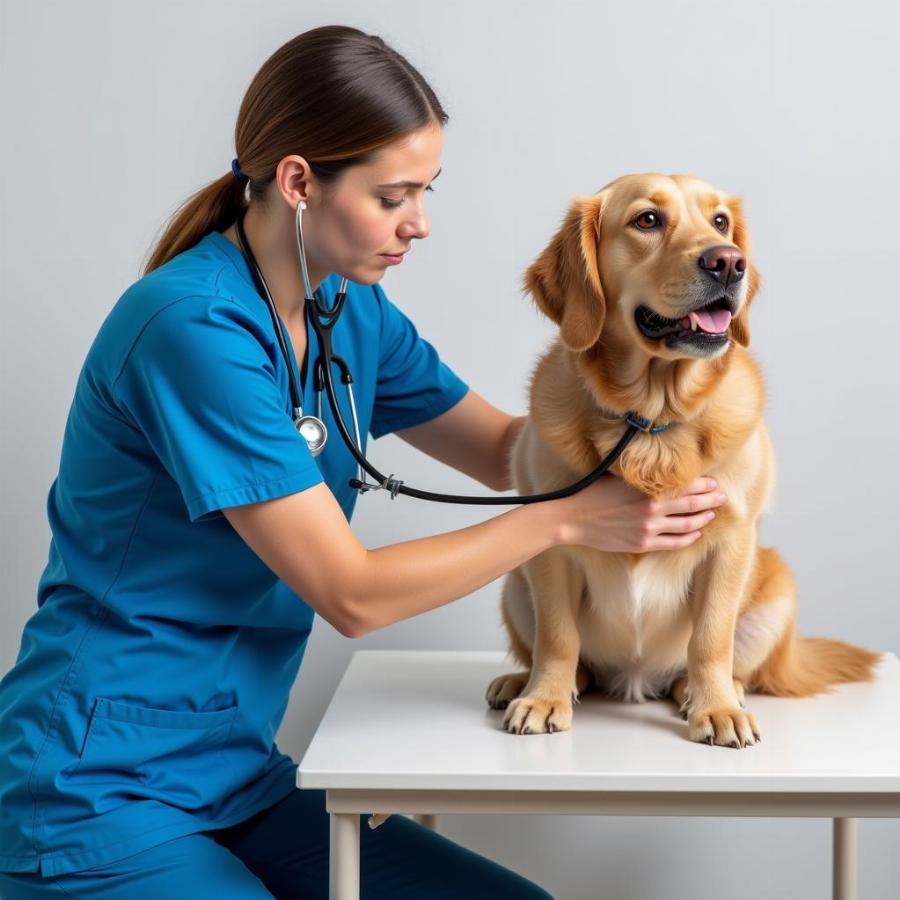Have you ever noticed your furry friend pacing, circling, or even taking a few steps between each bowel movement? While it might seem like just another quirky dog behavior, there are actually several reasons why your dog might walk and poop. Let’s explore the possible explanations behind this common canine habit, from instinctual behaviors to potential medical concerns.
Instinct and Scent Marking
One of the primary reasons dogs walk and poop is deeply rooted in their primal instincts. In the wild, dogs, like their wolf ancestors, use their waste to communicate with other canines.
- Scent Marking Territory: Dogs have scent glands in their paws, and by moving around while they poop, they’re essentially spreading their scent and marking their territory. This lets other dogs know they were there and can even convey information about their health and social status.
- Finding the “Perfect” Spot: Just like we might prefer a certain bathroom stall, dogs often sniff around and move until they find a spot that feels just right to do their business. This might involve finding a patch of grass that’s a comfortable texture or avoiding areas where other dogs have already left their mark.
Physical Comfort and Alignment
Beyond instinct, the act of walking and pooping can simply be a matter of physical comfort for your canine companion.
- Digestive System and Posture: The act of walking can actually help stimulate a dog’s digestive system, making it easier to pass bowel movements. Additionally, certain postures, like squatting or slightly arching their back while walking, might help align their intestines for optimal elimination.
- Relieving Discomfort: For some dogs, especially those with arthritis or other joint issues, standing in one place for too long can be uncomfortable. Walking and changing positions might help alleviate some of that discomfort and make the process easier.
Medical Reasons for Concern
While most of the time, walking and pooping is completely normal dog behavior, there are a few instances where it could signal an underlying medical condition.
- Gastrointestinal Issues: If your dog suddenly starts walking excessively while trying to poop, or if they seem to be straining or in pain, it could be a sign of a gastrointestinal problem like constipation, diarrhea, or even parasites.
- Urinary Tract Infections (UTIs): While not directly related to pooping, dogs with UTIs might also exhibit similar behavior, pacing and straining while trying to urinate.
- Anxiety or Stress: In some cases, excessive pacing or circling before or during defecation can be a sign of anxiety or stress. If you notice a sudden change in your dog’s behavior, it’s always best to consult your veterinarian to rule out any potential medical concerns.
When to Consult Your Veterinarian
If you notice any of the following, it’s essential to schedule a visit with your veterinarian:
- Blood in your dog’s stool
- Frequent diarrhea or constipation
- Loss of appetite or weight loss
- Lethargy or changes in behavior
- Excessive straining or vocalization during defecation
 Veterinarian Examining Dog
Veterinarian Examining Dog
Conclusion
Observing your dog’s behavior, even something as seemingly simple as how they poop, can provide valuable insights into their health and well-being. While walking and pooping is typically a normal canine instinct, it’s essential to be aware of potential medical reasons behind this behavior. If you notice any sudden changes or have concerns about your dog’s bathroom habits, it’s always best to err on the side of caution and consult with your trusted veterinarian.
FAQs
Q: Is it normal for my dog to circle multiple times before pooping?
A: Yes, many dogs circle before settling on the perfect spot to do their business. This is often instinctive behavior related to scent marking and finding a comfortable position.
Q: Why does my dog kick up grass after pooping?
A: Similar to circling, kicking up grass after pooping is another form of scent marking. The action helps disperse their scent even further, sending a clear message to other dogs in the area.
Q: My dog is suddenly pooping more frequently than usual. Should I be worried?
A: A sudden change in your dog’s bowel movements can be a cause for concern. It’s essential to monitor the situation closely and consult with your veterinarian if the increased frequency persists, especially if accompanied by other symptoms.
Q: Can I train my dog to stop walking and pooping?
A: While it’s challenging to completely eliminate this natural behavior, positive reinforcement techniques can encourage your dog to choose designated potty areas. Consistency and patience are key.
Need More Advice?
For more tips and information on all things dog-related, visit Beaut Dogs at https://beautdogs.com. If you have specific questions or concerns about your furry friend, don’t hesitate to reach out to our experts at [email protected]. We’re here to help you provide the best possible care for your canine companion!